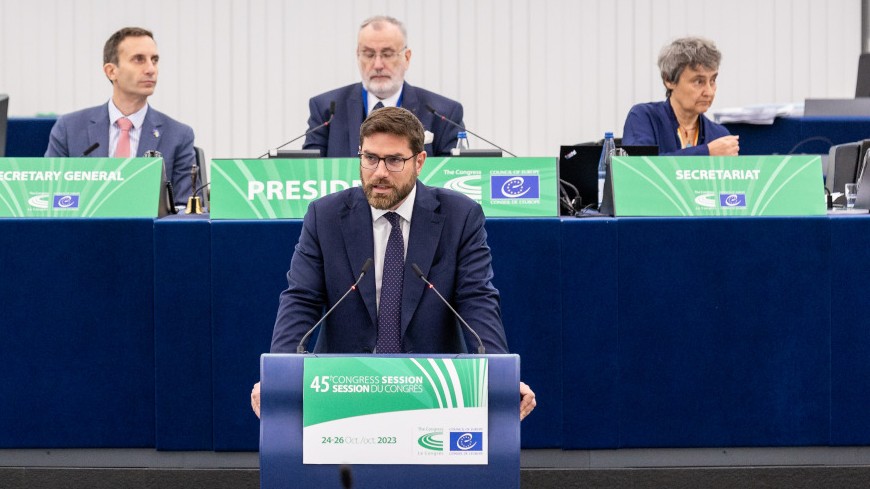An extremely unpleasant experience for those on the receiving end, verbal abuse and physical violence against local and regional elected representatives is on the rise throughout Europe. As well as being traumatic and damaging, such violence can also have a “demotivating” effect on elected representatives and deter citizens from engaging in politics, noted the Congress in a debate on the subject on Thursday 26 October.
Vincent Jeanbrun, mayor of Haÿ-les-Roses, a town some fifteen kilometres south of Paris, will never forget the night of 1 July 2023: as rioting broke out in towns and cities across France, the home where his wife and children were sleeping was ram-raided by rioters who tried to set it alight, while much of the town was ransacked. The mayor believes the attack was prompted by his refusal to tolerate drug dealing and disorderly conduct, but notes that many other towns were likewise rocked by major unrest. Determined not to let “the law of the dealers supplant the law of the State”, Mr Jeanbrun spoke of not wanting “the sound of Kalashnikovs to drown out the laughter of children in the streets” and pointed out that in Marseilles alone, some forty people were killed by violent gangs this year. “If we don't act, democracy and the State will end up being destroyed by criminal gangs,” he concluded.
Strengthening the resilience of local and regional elected representatives in tackling violence
Kristoffer Tamsons (R, Sweden, EPP/CCE), co-rapporteur in October 2022 of a Congress report on the impact of hate speech and fake news on the working conditions of local and regional elected representatives, pointed out that elected representatives are often “the last line of defence for democracy and human rights when it comes to tackling violence”, which has become “a European challenge that concerns us all”. In Sweden, local and regional elected representatives can receive training to help them deal with any threats they might receive, and these threats are regularly studied and measured in order to counter them more effectively.
Violence against local and regional elected representatives is a problem that affects all countries. A former Dutch vice-president of the Congress had to have bodyguards because of his efforts to combat the local mafia. And few can forget the murder of the mayor of Gdansk Paweł Adamowicz, who was killed by a local man with a history of violence while attending a charity event in January 2019.
Online violence: women elected representatives targeted more often than men
Samantha Townsend, a local councillor in Shildon (UK), entered politics to help people in their daily lives, but very soon found herself the target of online harassment and threats, including accusations that she was a paedophile. Very much present on social media, Ms Townsend says she intends to stay there because the vast majority of people behave well, and leaving would spell victory for the small minority of trolls who have pursued her for years. She would, however, like to see better regulation of social media, including in the interests of democratic debate.
During the debate, several members of the Congress talked about the threats or verbal abuse to which they had at times been personally subjected; several said that these phenomena affected women local elected representatives more often than men, and that elected representatives from minority groups were also more likely to be targeted than others.
Pauline Sterrer (L, Austria, EPP/CCE) recalled how an attempt had been made on the life of an Austrian local councillor and that one mayor had committed suicide after receiving threats; a third of members of the Austrian town councillors’ association had already received threats, women more often than men. As a result, “many elected representatives decline to run for re-election, and those who suffer abuse feel increasingly isolated”.
Joanne Louise Laban (L, United Kingdom, CON) said that no one stood for election to be insulted but that she herself had already been threatened with death, and told by people they wished she had cancer, because she was a Conservative. The danger was, however, that if councillors gave in, no one would want to get involved in politics. The English and Welsh local government association had launched a campaign to encourage people to stand up to violence, reiterating the message that it must not make people afraid to serve the community.
Political discourse also has an impact on violence
In the view of the Italian youth delegate Giulio Bernasconi, “mayors become the scapegoats for everything that goes wrong”, and online abuse is a threat to the proper functioning of democracy. Several members and delegates also felt that, in addition to online abuse, the violent nature of some political discourse could aggravate the situation and encourage physical violence.
At the end of the debate, Congress President Marc Cools (Belgium, ILDG) also returned to the subject of verbal abuse in politics: “We too must never resort to insults, and must always remember that democracy means showing respect for others”.


